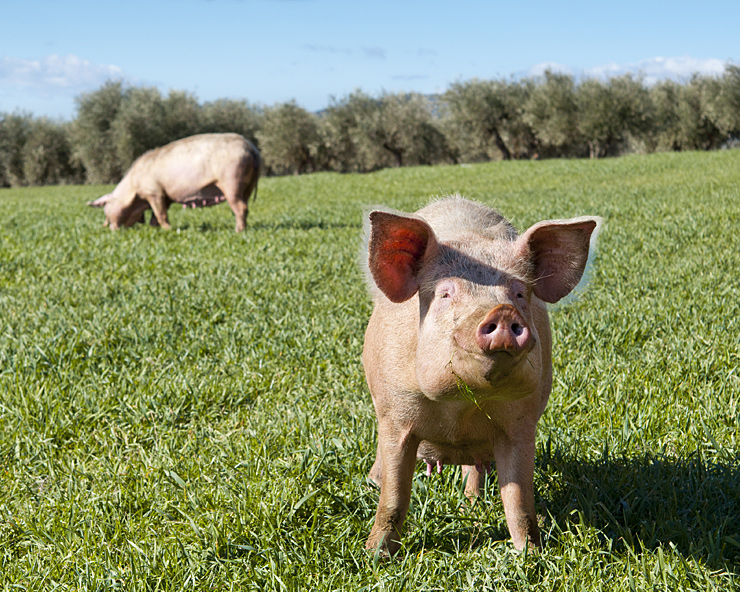What is African Swine Fever (ASF)?
Like Foot and Mouth Disease and Classical Swine Fever, African Swine Fever is a foreign animal disease (FAD), meaning it is not known to exist in the United States. In late July of 2021, African Swine Fever (ASF) was found in the Dominican Republic, and soon after, an outbreak occurred in Haiti.
The disease itself has been around since the 1920s, circulating mainly in African countries. This is the closest it has been to the United States, leaving many people to believe that it isn’t if we have the disease – but when. Both conventionally and alternatively raised pigs are susceptible to the disease. As swine producers, we must know about the disease to identify an outbreak quickly.
How is ASF spread?
ASF is unique in that it can spread in many different ways. An infected pig can directly give it to other pigs through body fluids, including oral and nasal secretions, blood, urine, and feces. Research has also shown that respiratory droplets can travel very short distances and infect other pigs. Objects that have come into contact with infected body fluids can spread the virus to different parts of your farm or even other farms if you share equipment with neighbors. In addition, several varieties of ticks can survive while infected with the virus and pass it to other animals that they feed on.
The virus can also be spread through raw and cured pork products that come from infected animals. It is known to survive in these tissues for weeks to months at refrigerated temperatures and possibly even years if frozen. The virus is killed when cooked to 158 degrees for at least 30 minutes.
What does ASF look like in swine?
ASF can look like many different diseases depending upon the virus strain. You may notice an increase in abortions, less feed intake, or pigs laying around more frequently on a herd level. Some affected pigs show signs of digestive upset with mucous diarrhea that progresses to having blood in it. Pigs may cough more regularly or show signs of difficulty breathing. On white pigs, you may notice red, blotchy areas of skin, especially on their ears, tails, and hams. There iscurrently no treatment for pigs that become infected with ASF.
Can I get ASF?
This virus only affects members of the swine family, such as wild boars, feral swine, warthogs, giant forest hogs, and the domesticated pigs we raise. ASF is not zoonotic.
What can I do to prevent ASF in my herd?
We must have strong disease prevention programs to protect our herds from the virus. Maintaining good disease prevention and hygiene practices each day will limit the germs that enter your farm and keep your animals healthier. It is also vital for visitors and employees to follow the same guidelines. If visitors have been out of the country recently, it may be best for them to come back another time to limit the risk of accidentally carrying on a foreign virus to your farm. Find more information in our post about keeping your animals healthy with visitors and workers coming onto your farm. There are no approved vaccines for ASF prevention.
Feral hogs can carry this virus as well as many other diseases. If you live in an area with feral hogs, maintaining your fences is crucial to prevent your pigs from co-mingling with the wild ones. Check with local regulations regarding safe and legal ways to control the population around your farm.
As with any disease, taking the time to look at your herd thoroughly and every day can help you find problems sooner. If you notice something that doesn’t seem quite right with an animal, write it down; if it continues or other animals become affected, you will be able to look back and see if there is a pattern. Catching the disease early is especially important with ASF as the consequences of an outbreak are enormous.
Why is ASF so concerning to the United States?
ASF is a highly contagious virus that can spread quickly throughout pig facilities, wiping out entire herds. If the virus entered the United States, it would be devastating to our pork producers and the economy as a whole. Since there are no vaccines or treatments, the only way to entirely stop the spread would be an outstanding disease prevention program and humane euthanasia of infected pigs and all pigs in contact with them.
Suspect ASF?
Notice something off with your pigs? Quick action can be the difference between preventing your neighboring swine farm from being infected and the disease becoming endemic in the United States. If you suspect illness within your herd and are unsure what could be affecting them, it is always best to contact your local veterinarian, extension agent, or the USDA directly at 1-866-536-7593.
Further Information on ASF:
Fast Facts African Swine Fever, CFSPH
African Swine Fever Technical Factsheet, CFSPH
African Swine Fever, World Organization for Animal Health
African Swine Fever, Iowa Department of Agriculture & Land Stewardship
African Swine Fever, Pork Checkoff

